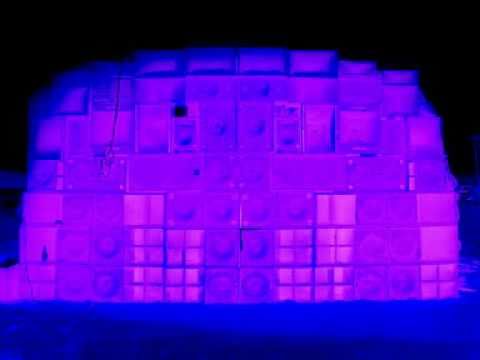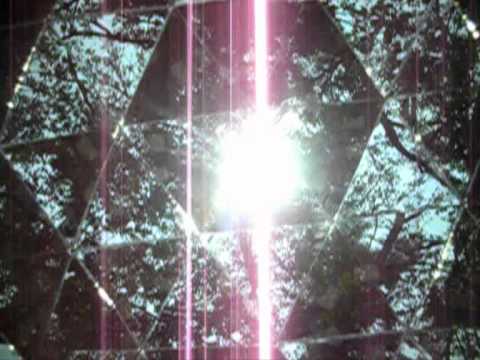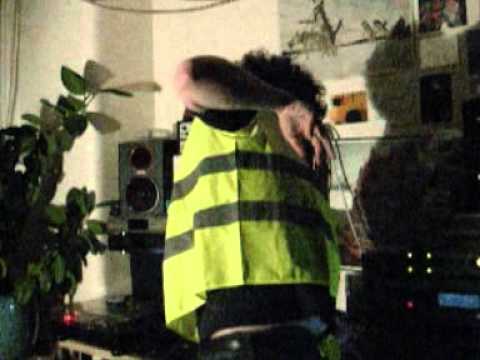A flourish of gaily coloured audio tapes adorns the mantelpiece of an upstairs kitchen in Hackney. I pick out the only spine written in English. And there, in impeccable Letraset, reads the rather fitting title: SPATIAL DISCO MUSIC.
“Sadly not as good as it looks,” Ralph Cumbers assures me, as he lifts a steel kettle off the stove and pours tea, “It’s a great name though. I might use it. These were bought in Israel – mostly Arabic, from Lebanon and Libya I reckon. Just a little kitchen-listening selection. You should see the massive stack of the bastards in the other room. Here’s one with a highly unimpressed grandfather on it”.
For Cumbers, the artist most commonly known as Bass Clef (though who also releases under the aliases Some Truths and Coseph Jonrad), the audio cassette is a crucial tool. From mixing all his work on a simple four-track recorder to the myriad cassette releases available through his label Magic + Dreams, this supposedly dead format has come to epitomise a lifetime’s obsession with analogue sound and technology.
“Basically, if you’re using Reason you already know more about making music on computers than I do” he says, pointing to a laptop in the corner. “There’s that fucker over there, but that’s just for editing. Other than that it’s just a four-track tape recorder. Everything goes on tape first, then I mix it down”.
Cumbers brings to mind the romantic notion of those seventies pioneers, from King Tubby to Arthur Russell, who stood knee deep in reels of recording tape – dust-smothered echo chambers, phasers and compressors humming away like living, breathing machinery.
Many will have been introduced to his Bass Clef music during his days as a dubstep outlier, and the release of 2006 debut album A Smile Is A Curve That Straightens Most Things. “I was really lucky in 2006 to be sort of on the edge of it all," he says. "I knew Laurie Appleblim from when I was a teenager and I knew people like [Punch Drunk label head] Peverelist and [Tectonic label head] Pinch from my Bristol days. It was a good place to be, on the periphery of the scene, but the music went in one direction and I went off in another”.
Tea poured, he leads me through to what is known in MTV Cribs parlance as ‘Where The Magic Happens’. Magic, incidentally, is our host’s blogging handle – a name that brings to mind imagery of deft studio tricks and sonic alchemy. Bass Clef’s studio doesn’t disappoint. Decked out in modest wood-panel retro, a suitably impressive array of sockets, plugs and twiddly bits lines one wall. I narrowly avoid toppling over an eight-foot unit of 12”s running along the other. Tapes and vinyl. Four-track recorders. What’s wrong with digital?
“I think digital’s great,” says Cumbers. “Super easy, convenient. But it’s nothing like vinyl. There’s no secret about that, man. It’s like having a real fire rather than a radiator. But tapes were my first love. Getting a tape walkman at age 10 was a total epiphany for me. The first time I listened to music on headphones, it was like a landscape I could walk around in. I was lost to the world.”
He shows us a stack of cassettes ready to be sent out by mail order. They’re copies of Tapeswap, his new collaborative album with Bristolian producer Nick Edwards, aka Ekoplekz, released under the name Ekoclef.
“Because all my music’s made on cassette in the first place there’s a pleasing logic to it being released that way," he says. "When i first heard the Ekoplekz stuff it was fucking raw and really spot on. As we were using almost the same four-track I suggested we try tapeswapping.”
The album itself was created by mailing a single tape back and forth between the two artists, each taking turns to record onto one of its four tracks. “The tape would arrive in the post," he says, "and it’d be like opening a present, listening to what Nick had added to the tracks and where they’d been taken – often in very unexpected directions."
The result is an eerie, rumbling interpretation of vintage dub featuring huge chasms of analogue feedback. You can hear the grot and hiss of tape-reel against magnetic head, a kinetic presence felt throughout these live-jammed takes.
As ever, Ralph finds it hard to contain his enthusiasm for the format. “The sleeves were made by letterpress – big old-school mechanical printing presses where the operator has to set the type by hand like they used to with newspapers and books," he says. "Of course being a massive luddite, I love the fact it’s all made mechanically. Plus it looks great! We’re both very comfortable improvising, so Ekoclef live will be a new experience but a good one I think. It won’t be a recreation of the album – I hope it’ll be something else entirely.”
When asked why he chose to follow the analogue path, Ralph explains that it was simply a matter of resources. “It’s just the way things were," he states, simply. "I started on guitar FX pedals in my teenage years while playing bass in a band. There was no GarageBand back then, so we started using four tracks. This is a Yamaha MT4X. I’ve no idea if it’s the best or not, but it’s good enough for me, and I’m so used to it now."
“I had an Atari back in the day but I could never get on with it," he continues. "Fiddly, tiny little screen – I didn’t like it. With a computer you’re just sat there, square-eyed, just doing this [gestures] with your hand on the mouse, whereas when I’ve got a track going on I’m walking around… listening to it over here… or over here… bopping around, staring out the window while I tweak a snare…"
COSEPH JONRAD ‘rain again’ from Coseph Jonrad on Vimeo.
The obsession with vintage formats and flavours continues. Cumbers’ latest in a string of releases this year, FIAT MILLION HITS, features super-edited remixes sourced from a tape of pop songs won with a car by his family in 1983. The album, released for free under the Coseph Jonrad pseudonym, re-imagines singles by Billy Ocean, Wham and Bonnie Tyler as vaporific warehouse thumpers and echoing sound clashes. The Thompson Twins’ ‘You Take Me Up’ is chopped and looped right down to the line "I know what it means to work hard on machines", until the latter breaks down into granular fuzz. Duran Duran’s ‘Rio’ is turned into an industrial pounder while Club Tropicana’s outro vocals are stretched to celestial capacity.
The album is a tongue-in-cheek salute to Cumbers’ early days. I find myself reminded of my own family’s default car tape, recorded off Radio 1 with snippets of arrested chatter courtesy of David Kid Jensen. I come to realise that the imperfections of analogue and the happy accidents that arise from it are what intrigue Cumbers – not simply luddism, as he so self-deprecatingly claims. Nevertheless, the past is a mine of inspiration to the man, who is as much a musicophile as a musician. Only a few months ago he released a new Bass Clef record, Inner Space Break Free, a tribute to the early rave sounds of his youth.
“I’d been working for nearly a year on the third Bass Clef album and I’d got really stuck," he says. "It’s a big project – an ambitious, sweeping album ‘about’ London. Or a vision of London anyway. But I’d lost the thread of what I was trying to do. We were setting up the label, getting the Some Truths and Coseph Jonrad albums ready for release, when I suddenly had this intense two-week burst of creativity. I’d been thinking about times when I’d been really happy with music – really feeling its endless directions and opportunities. Those times were really the days of jungle – ‘92 to ’96, say – so the album really ended up with a heavy flavour of those times. It was kind of about using the aural signifiers of rave, hardcore and techno – and trying to make something that expresses the bittersweet sense of longing and loss and joy and inspiration I get from it all.”
Throughout Cumbers’ music, what remains constant is his treatment of its subject matter – a mixture of reverence and humour, captured perfectly in the homemade video for Inner Space Break Free‘s effervescent opener ‘I Think You Are Ready Now For The Eternal Point Of No Return’.
“One weekend I didn’t have a show and I was home on a Friday night.” he explains, “I didn’t feel like going out but I was in a fun mood, so after a couple of Stellas I got the idea to make the video, and then there it was. I didn’t show it to anyone for a while ‘cos I thought it was a bit silly. Eventually I showed my agent and some close friends and they all loved it. Of course I was a bit worried about my ‘dignity’, but then I kind of thought, well, the video is how I am in real life – why hide it?”





